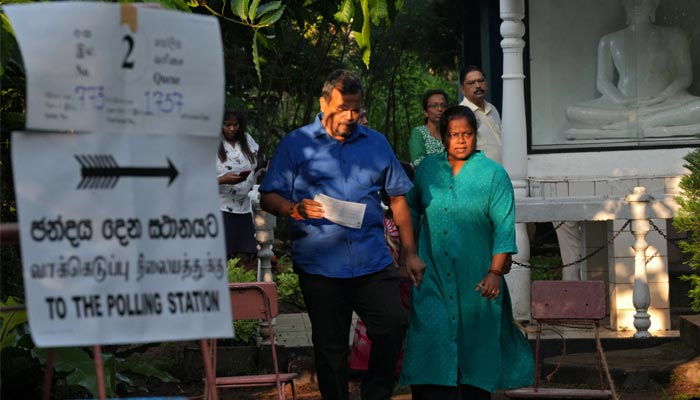
[ad_1]

- Leftist president’s coalition seeks to expand parliamentary presence.
- Key issues for voters include IMF bailout and economic recovery.
- Results for snap election are expected to be announced on Friday.
COLOMBO: Sri Lankans began voting in a snap election on Thursday which will determine if the island nation wants to empower its new, leftist President Anura Kumara Dissanayake to push his pro-poor policies as it recovers from a financial meltdown.
A little over 17 million Sri Lankans are eligible to elect lawmakers to the 225-member parliament for a five-year term. A record 690 political parties and independent groups are in the fray across 22 electoral districts.
Marxist-leaning Dissanayake, 55, was elected president in September but his National People’s Power (NPP) coalition had just three of 225 seats in parliament, prompting him to dissolve the legislature almost a year before its term ended and seek a fresh mandate.
Over 7,000 police personnel have been deployed to ensure free and fair elections at the more than 13,400 polling stations set up across the country, police officers told Reuters.
“The military is also on standby to assist the police but we do not expect any incidents,” said Police Spokesman Nihal Thalduwa, adding that voting was proceeding smoothly.
As polling opened in the early hours of the morning, people began trickling into temples, schools and other public buildings being used as polling stations.
“I think we are seeing the first signs of a positive political change in Sri Lanka after the president was elected and we should give him the chance to continue that change,” said a voter.
Analysts say Dissanayake’s coalition is expected to draw significant support, while a victory for a rival could lead to a policy logjam the country cannot afford.
The Samagi Jana Balawegaya party of opposition leader Sajith Premadasa — who favours a mix of interventionist and free-market economic policies — is NPP’s main challenger.
The other key contender is the New Democratic Front, backed by previous President Ranil Wickremesinghe.
“All arrangements are in place and we appeal to the public to work with us to ensure a free and fair election,” Election Commission Chairman R M L Rathnayake told reporters at a pre-election briefing on Tuesday.
Votes will be counted soon after polling closes on Thursday and results are expected to be announced on Friday.
A country of 22 million people just across the southern tip of India, Sri Lanka was crushed by a 2022 economic crisis triggered by a severe shortfall of foreign currency, causing the economy to shrink by 7.3% in 2022 and 2.3% last year.
Boosted by a $2.9 billion bailout programme from the International Monetary Fund (IMF), the economy has begun a tentative recovery, but the high cost of living is still a critical issue for many voters, especially the poor.
Dissanayake wants to push anti-poverty policies including bigger welfare schemes and fight corruption as a political outsider in a country dominated by family parties for decades.
He also aims to tweak targets set under the IMF programme to reduce high income taxes and free up funds to invest in welfare for millions hit hardest by the crisis.
The new government must deliver a budget to reach a crucial primary surplus target of 2.3% of gross domestic product (GDP) in 2025 set under the IMF programme, deliver pro-poor policies, and put growth on a sustainable path.
But investors worry Dissanayake’s desire to revisit the terms of the IMF bailout could delay future disbursements, and make it harder for Sri Lanka to hit that primary surplus target.
“In past elections, people did not have confidence in us but in September people gave us victory and proved that we are a winning party and we can form a government,” Dissanayake said on Sunday as the campaign neared its conclusion.
“The next task is to unite people from the four corners of this country and build a powerful people’s movement,” he said.
[ad_2]
Source link